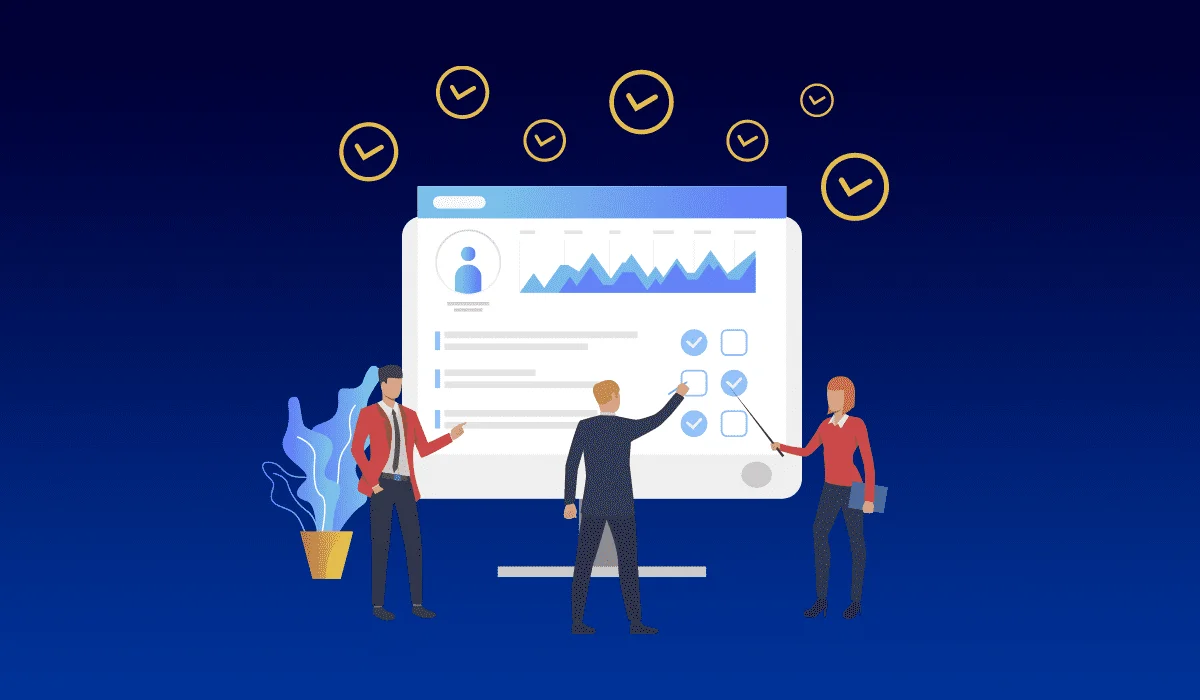Optimizing Website Performance for Better SEO and User Engagement
Sangeeth. K20 Mar 2024
Imagine that you need to find a great birthday gift for your friend and run out of time. You open your laptop and get ready to shop online.
However, when you click on a website that looks promising, it takes forever to load.
You start getting frustrated as you wait and wait.
Finally, the website appears, but it’s a mess.
There are so many pictures and words that it’s almost impossible to find what you’re looking for.
You go back to the previous page and try a different website that loads super quickly like a flash of lightning.
Sound familiar?
Website performance isn’t just a technical detail; it’s a make-or-break factor for your online success.
It’s the difference between capturing a visitor’s attention and sending them fleeing back to the search results.
However, the impact of improving the website performance goes beyond user experience.
It’s also a powerhouse influencer on your SEO rankings.
Search engines like Google prioritize websites that load quickly and deliver a smooth, enjoyable experience.
A slow website, on the other hand, gets pushed to the back of the queue, gathering digital dust while its competitors shine in the spotlight.
So, how do you ensure that your website loads quickly?
This blog post is your roadmap to optimizing your website performance for both better SEO and user experience.

What’s Ahead
Best Practices and Techniques for Optimizing Website Performance
Optimizing website performance is crucial for a better user experience.
Here are some simple best practices and techniques for improving your website performance:
Compressing Images and Files
Compressing your images and other files reduces their size, which can make your website load faster.
There are many tools available that can compress your files without sacrificing quality, so it’s a good idea to use them.
Minimizing HTTP Requests
Every time your website loads, it sends an HTTP request to the server.
If you have too many requests, it can slow down your website.
You can minimize these requests by reducing the number of images, scripts, and other files you use on your website.
Content Delivery Networks (CDNs)
A CDN is a network of servers that distribute your website’s content across the world.
This can help your website load faster for visitors in different locations.
You can use a CDN service to deliver your website’s content more efficiently.
Detect 404 Errors
A 404 error occurs when a user tries to access a page on your website that doesn’t exist.
These errors can slow down your website and frustrate your visitors.
Detecting these errors and fixing them quickly can help improve your website’s performance.
Efficient Coding and Script Minification
The code and scripts on your website can affect its speed and performance.
Writing efficient code and minifying your scripts can help reduce the amount of time it takes for your website to load.
Reducing Redirects and Broken Links
Redirects and broken links can slow down your website and cause frustration for your visitors.
Try to reduce the number of redirects you use and regularly check your website for broken links.
Void Using Too Many Plugins
Plugins can add functionality to your website, but too many plugins can slow it down and cause security issues.
Try to limit the number of plugins you use and regularly check to see if any plugins are causing problems.
Ongoing Monitoring and Performance Maintenance
Your website’s performance can change over time due to changes in traffic, code updates, and other factors.
Regularly monitoring your website’s performance and making adjustments as needed can help keep it running smoothly.
SEO Benefits of Website Performance
When it comes to optimizing your website for search engines, focusing on website performance is crucial.
A well-performing website can bring several benefits to your SEO efforts.
Let’s explore some of them:
Improved Search Rankings
By ensuring that your website is fast, responsive, and user-friendly, search engines like Google are more likely to rank it higher in search results.
This means that your website will be more visible to potential visitors and customers.
Increase Website Traffic
A website that performs well not only attracts search engine attention but also encourages visitors to stay and explore.
This can result in increased traffic to your website, as people are more likely to click on your website when it appears in search results.
Lower Bounce Rates and Increased Dwell Time
A slow website can frustrate visitors, leading them to leave before even exploring it.
On the other hand, a fast-loading website can reduce bounce rates and increase the amount of time visitors spend on your website.
This signals to search engines that your website provides valuable content, which can further improve your rankings.
Boost Brand Reputation
A well-performing website reflects positively on your brand.
When users have a smooth and seamless experience on your website, they are more likely to trust your brand and view it in a positive light.
This can help enhance your brand reputation and credibility.
Enhance Website Security
Website performance is not just about speed and usability; it also includes the security of your website.
A secure website protects both your business and your users from potential threats and attacks.
Search engines prioritize websites that are safe to visit, which can have a positive impact on your search rankings.
Investing in optimizing your website’s performance brings several SEO benefits.
It can improve your search rankings, increase website traffic, reduce bounce rates, boost brand reputation, and enhance website security.
By prioritizing performance, you can support your overall SEO strategy and ultimately drive more organic traffic to your website.
Ways for Measuring and Improving Website Performance
Measuring and improving website performance is essential to ensure that your website is fast, user-friendly, and optimized for search engines.
Here are some simple ways to achieve this:
Google PageSpeed Insights
This free tool from Google analyzes your website’s performance and provides suggestions for improvement.
PageSpeed Insights gives your website a score and highlights areas that need attention, such as image optimization or minifying code.
By following the recommended optimizations, you can enhance your website’s speed and overall performance.
GTmetrix
Similar to PageSpeed Insights, GTmetrix is another popular tool for measuring website performance.
It provides a detailed analysis of your website’s speed, identifies areas for improvement, and offers suggestions on how to optimize your website.
GTmetrix also gives you insights into factors like page load time, page size, and the number of requests made by your website.
WebPageTest
This tool allows you to test your website’s performance from different locations around the world, giving you a comprehensive view of its speed and performance.
WebPageTest provides detailed reports with suggestions for improving your website’s performance, including recommendations for caching, minimizing round trips, and optimizing content delivery.
Optimizing Performance Through Content Management Systems (CMS)
If your website uses a CMS like WordPress or Joomla, you can further enhance performance by optimizing your CMS settings.
This includes enabling caching, compressing images, and using efficient themes and plugins.
Checking and updating your CMS regularly can also help ensure its performance.
Hiring Professionals
If you’re not confident in your technical skills or don’t have the time to dedicate to website optimization, consider hiring professionals to help you.
Web developers and SEO experts can analyze your website, make necessary improvements, and offer ongoing support to ensure your website performs at its best.
By regularly measuring your website’s performance using tools like Google PageSpeed Insights, GTmetrix, and WebPageTest, you can identify areas that need improvement and take appropriate actions.
Additionally, optimizing your website through CMS settings and seeking professional assistance when needed can help boost your website’s speed, user experience, and overall performance.
Wrap-Up
Improving your website’s performance is key to boosting both SEO and user engagement.
By optimizing load times, streamlining content, and adopting the best tips on optimizing website performance, you create a smoother and more enjoyable experience for visitors.
This not only pleases search engines but also keeps users happy and engaged.
Prioritizing performance isn’t just a technical change; it’s a strategic move.
It is done to enhance your online presence, attract more visitors, and ultimately achieve better results in the competitive digital landscape.
So, invest time in optimizing your website performance, because a faster, more efficient site is a win-win for both search rankings and user satisfaction.
If you wish to learn more about Search engines and SEO feel free to check out our following blogs as well!
- On-Page SEO Optimization: Best Practices and Tips
- E-commerce SEO: How to Rank Your Online Store
- Technical SEO: Essential Elements for Website Success
- Understanding How the Search Engine Works
- Tips to Optimize Your Website for Google Mobile-First Indexing
Latest Post

5 Do’s and Don’ts When It Comes To SEO
 18 Sep 2023
Readmore
18 Sep 2023
Readmore
Want to learn more about the digital marketing service we provide?
Contact Us to Get Started!




